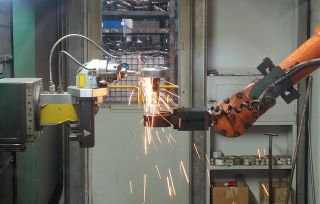For years, trade occupations like welding, plumbing, and electrical were considered undesirable career paths. These positions were stereotyped in popular culture by those who pushed for college degrees instead. But now, the trades are experiencing a renaissance due to technological advancements and labor shortages.
The Role of Technology in the Trades
Technology has played a significant role in transforming the trades. For example, welding traditionally involved manual labor, and welders had to be highly skilled to produce a quality weld. But with the rise of robotic welders used in many industries, welders must learn technical skills beyond the placement of the weld itself.
Similarly, plumbing has become more sophisticated, with advanced materials and systems requiring specialized training. Video, ultrasonics, and other non-destructive testing methods are now used in plumbing applications.
Electricians now work with smart homes, renewable energy systems, and other advanced technology that requires new skills. Each new technology requires them to learn the software, hardware, and systems used.
Labor Shortages
In addition to the increasing need for technical skills, the shortage of trade workers has created new business opportunities and increased wages. As more people pursue white-collar careers, the demand for skilled tradespeople has increased. The numbers are scary. This year alone, the US construction industry will need to hire over half a million new workers beyond the average pace of hiring.
A Changing Landscape
The technology explosion and acute labor shortages have changed workers’ perceptions of the trades. Many now see the trades as a viable career path with a potential for growth and higher earnings.
The changing nature of work has also fueled the renaissance in the trades. As technology and natural events like COVID-19 altered the workplace landscape, many are now looking for jobs that offer more flexibility, autonomy, and a better work-life balance. Trades jobs are often project-based, meaning workers have more project flexibility. They also provide a more diverse work environment outside the confines of an office or factory.
Another reason for the renaissance in the trades is the potential for entrepreneurship. Those within the trades can start their businesses and have more control over their work-life balance. Others have taken advantage of new opportunities in how work is conducted. By shifting their business model to a gig project format, business leaders can exert complete control over their schedule, pricing, work hours, and more.
Challenges Remain
Even with all of these changing dynamics, a few challenges remain. One of the biggest challenges is the skills gap. As technology advances, the skills required for trades are becoming more specialized. But the decade-long gap of new entrants into trades has left the pool of talent depleted. This depletion has created a growing need for those with experience in automation, programming, and data analysis. Trade workers must continually update their skills to remain relevant and competitive.
Another challenge is the perception of the trades among young people. Many young people still see the trade as a last resort. As labor shortages continue, a combined effort of media, popular culture, secondary education leaders, and others will change this perception positively.
Turning Trades Into a Business
The renaissance in the trades is well underway, fueled by technology, labor shortages, and changing attitudes toward work.
The Henry Bernick Entrepreneurship Centre (HBEC) at Georgian College understands that new business ideas need training and guidance. If you wish to incorporate the trades into your business model or begin an entrepreneurial career in the trades, we can offer support through our entrepreneurship and mentorship programs.
Contact us to learn more about leveraging these opportunities.










